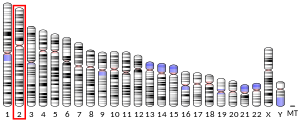PELI1
Appearance
Protein pellino homolog 1 is a protein that in humans is encoded by the PELI1 gene.[5][6][7]
References
[edit]- ^ a b c GRCh38: Ensembl release 89: ENSG00000197329 – Ensembl, May 2017
- ^ a b c GRCm38: Ensembl release 89: ENSMUSG00000020134 – Ensembl, May 2017
- ^ "Human PubMed Reference:". National Center for Biotechnology Information, U.S. National Library of Medicine.
- ^ "Mouse PubMed Reference:". National Center for Biotechnology Information, U.S. National Library of Medicine.
- ^ Resch K, Jockusch H, Schmitt-John T (Apr 2001). "Assignment of homologous genes, Peli1/PELI1 and Peli2/PELI2, for the Pelle adaptor protein Pellino to mouse chromosomes 11 and 14 and human chromosomes 2p13.3 and 14q21, respectively, by physical and radiation hybrid mapping". Cytogenet Cell Genet. 92 (1–2): 172–174. doi:10.1159/000056895. PMID 11306823. S2CID 83911010.
- ^ Choi KC, Lee YS, Lim S, Choi HK, Lee CH, Lee EK, Hong S, Kim IH, Kim SJ, Park SH (Sep 2006). "Smad6 negatively regulates interleukin 1-receptor-Toll-like receptor signaling through direct interaction with the adaptor Pellino-1". Nat Immunol. 7 (10): 1057–1065. doi:10.1038/ni1383. PMID 16951688. S2CID 9646386.
- ^ "Entrez Gene: PELI1 pellino homolog 1 (Drosophila)".
Further reading
[edit]- Rich T, Allen RL, Lucas AM, et al. (2001). "Pellino-related sequences from Caenorhabditis elegans and Homo sapiens". Immunogenetics. 52 (1–2): 145–149. doi:10.1007/s002510000249. PMID 11132151. S2CID 13467302.
- Strausberg RL, Feingold EA, Grouse LH, et al. (2003). "Generation and initial analysis of more than 15,000 full-length human and mouse cDNA sequences". Proc. Natl. Acad. Sci. U.S.A. 99 (26): 16899–16903. Bibcode:2002PNAS...9916899M. doi:10.1073/pnas.242603899. PMC 139241. PMID 12477932.
- Jiang Z, Johnson HJ, Nie H, et al. (2003). "Pellino 1 is required for interleukin-1 (IL-1)-mediated signaling through its interaction with the IL-1 receptor-associated kinase 4 (IRAK4)-IRAK-tumor necrosis factor receptor-associated factor 6 (TRAF6) complex". J. Biol. Chem. 278 (13): 10952–10956. doi:10.1074/jbc.M212112200. PMID 12496252.
- Jensen LE, Whitehead AS (2003). "Pellino2 activates the mitogen activated protein kinase pathway". FEBS Lett. 545 (2–3): 199–202. doi:10.1016/S0014-5793(03)00533-7. PMID 12804775. S2CID 46719284.
- Ota T, Suzuki Y, Nishikawa T, et al. (2004). "Complete sequencing and characterization of 21,243 full-length human cDNAs". Nat. Genet. 36 (1): 40–45. doi:10.1038/ng1285. PMID 14702039.
- Gerhard DS, Wagner L, Feingold EA, et al. (2004). "The status, quality, and expansion of the NIH full-length cDNA project: the Mammalian Gene Collection (MGC)". Genome Res. 14 (10B): 2121–2127. doi:10.1101/gr.2596504. PMC 528928. PMID 15489334.
- Butler MP, Hanly JA, Moynagh PN (2005). "Pellino3 is a novel upstream regulator of p38 MAPK and activates CREB in a p38-dependent manner" (PDF). J. Biol. Chem. 280 (30): 27759–27768. doi:10.1074/jbc.M500756200. PMID 15917247. S2CID 30374239.
- Butler MP, Hanly JA, Moynagh PN (2007). "Kinase-active interleukin-1 receptor-associated kinases promote polyubiquitination and degradation of the Pellino family: direct evidence for PELLINO proteins being ubiquitin-protein isopeptide ligases". J. Biol. Chem. 282 (41): 29729–29737. doi:10.1074/jbc.M704558200. PMID 17675297.





